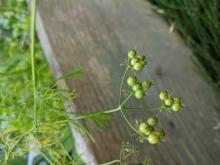11th Annual Seed Swap: Free Seeds to Start Your Garden
Seed Swap & Giveaway
Dozens of vegetable and flower types and hundreds of varieties, including unique heirlooms and locally saved seeds will be available for free to encourage people in Evanston to grow their own food. (A limit as to the number of seed packets per person will be posted at the event.)
In addition to generous seed companies and farms, you can donate seeds you grew and saved or seed packets from past years you don't plan to use. Bring seeds with you and we'll let you take more home.


